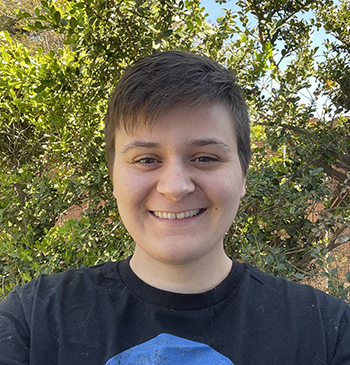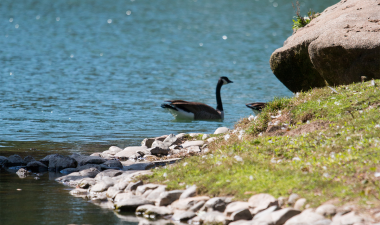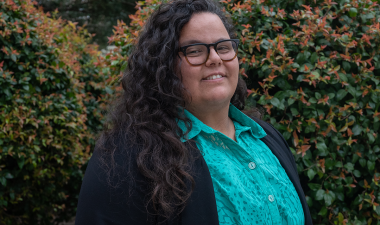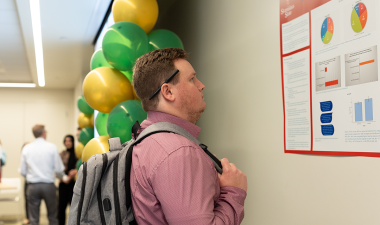
Phoebe Roberts, a Stanislaus State Master of English Literature student, thought making a documentary-style presentation of her research project, “Poison and Femininity on the Renaissance Stage,” would be easier than writing an essay.
The alternative format for English Professor Tony Perrello’s Rennaissance Revenge Tragedy course was more work than she expected, but it proved to be worthwhile.
Encouraged by Perrello, Roberts cut her 30-minute class project to eight minutes, and she placed second in the Graduate Arts and Humanities division of the California State University’s 35th Annual Student Research Competition. She and another Stan State student won Outstanding Overall Presentation honors at the Stan State competition held prior to the systemwide event.
“I’ve never done anything like that in my life,” said Roberts, of Manteca, who earned her undergraduate degree in English and philosophy from UC Davis and started her master’s program at Stan State last fall. “I had never done research quite this thorough before. Obviously, I’d done research papers, but this is the first time I had really specialized and took a deep look into something.”
She praises Perrello for his inspiration and for encouraging his students to present their work in different ways.
“I still see the value in a traditional research paper, and that option is always available,” Perrello said. “Phoebe’s ‘Dateline’-style investigative report about poison in early modern culture and its fear-inducing gendering is a prime example of meaningful research presented in a familiar, modern format. Her work is imaginative and riveting. I am proud of her for winning an award at the state level. Roberts was amazed to earn second place.
“There were astounding presentations and really talented competitors,” she said of the CSU competition designed to encourage student research.
Her topic evolved as she read a variety of Rennaissance plays in Perrello’s class and saw a common thread, where poison was the weapon of choice for women and effeminate characters.
Roberts, who is particularly proud of the film editing skills she acquired in making her documentary, studied crime statistics of the era and read other plays and writings recommended by Perrello to understand how and why poisoning became such a common act of female characters.
When Perrello saw the finished project, he encouraged Roberts to compete in the student research competition, which she was unfamiliar with.
“It’s common for students entering a graduate program to suffer anxiety and self-doubt, to wonder whether they’re ‘good enough’ or whether they even belong in graduate school,” said Perrello, Stan State’s 2018 Outstanding Professor. “I think Phoebe felt this way, at least at first. She was not aware of her own potential. She is still gobsmacked by her success. She’s got the necessary tools, though: smarts, imagination, curiosity and technological savvy.”
The research competition was an invaluable learning experience for Roberts.
“I’m shocked at how relevant it all seems today,” Roberts said. “The whole project revolves around the Rennaissance media putting a taboo on this idea of poison and stifling this group of people who might use it.
“I’m reminded of the COVID vaccine, where certain media members are putting the taboo on it as a way of stifling people. It’s so relevant now. It’s shocking, because you don’t think of Rennaissance drama as something particularly relevant today, but it absolutely is.”
Although she began her master’s program with no particular goal other than to qualify for interesting jobs she’d seen posted, Roberts sees more research in her future.
“I was going along before I got into this, keeping my head down and doing my work,” Roberts said. “Now that I know these opportunities are out there, every paper I write, I’m going to think of as something I could potentially take to a conference or take on as a deeper project. In an ideal world, I’d find a book ready to be published that needs a chapter on poison.”
She credits Perrello with fueling this dream with his first email about her project in October.
“I’ve had professors who have tried to encourage me,” Roberts said. “They didn’t push me to do conferences. They pushed me to experiment with form or write about a topic I was less familiar with, but Dr. Perrello is the first one who said he could see this going somewhere and encouraged me to take the next step of putting it out there. Obviously, that’s just invaluable.”


